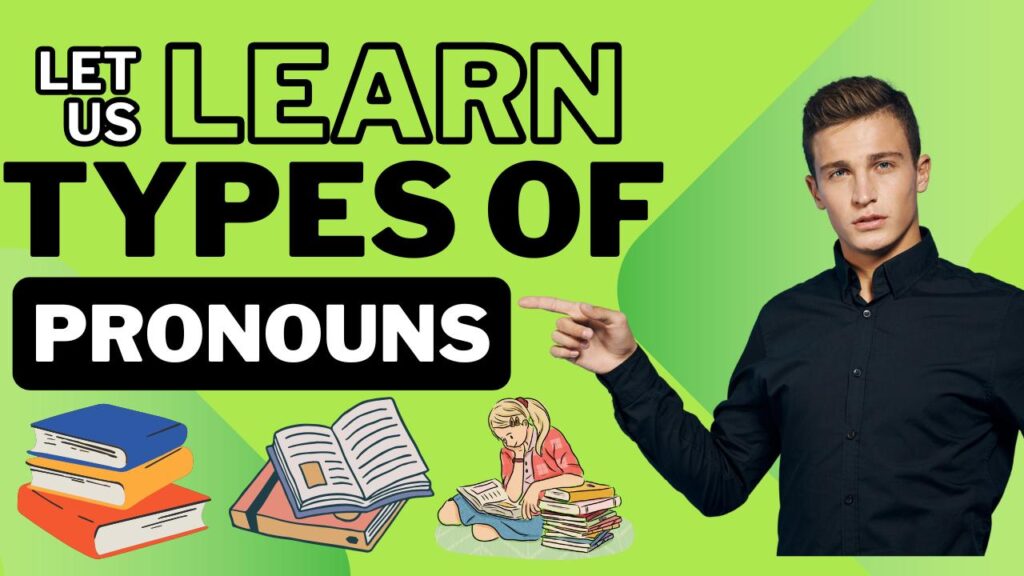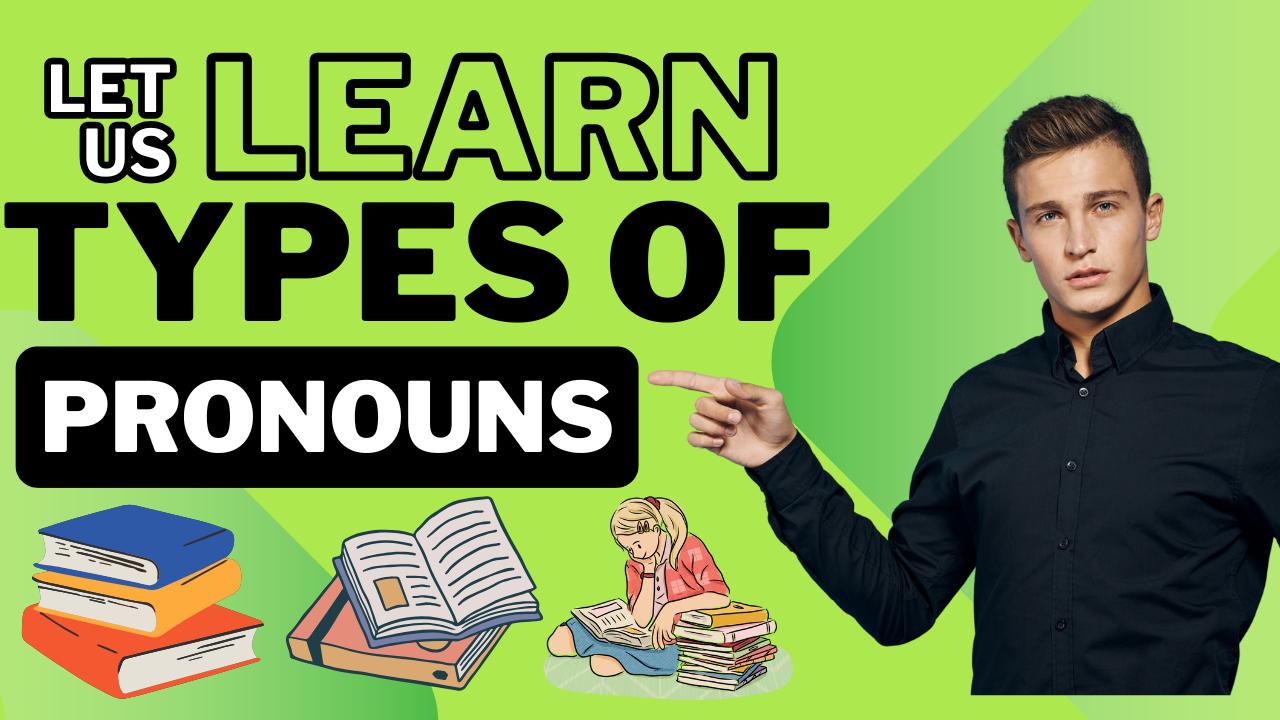PRONOUNS

WHAT IS PRONOUNS?
A pronoun is a word that can replace a noun in a sentence. The noun that is replaced by a pronoun is called an antecedent. For example, in the sentence I love my dog because he is a good, the word he is a pronoun that replaces the noun dog.
Generally speaking, pronouns allow us to shorten our sentences and make them sound less repetitive. For example
Pronoun list
- He
- It
- You
- I
- They
- We
- Who
- Him
- Them
- Whoever
- Anyone
- Something
- Nobody
We use a bunch of different pronouns in our writing and in speech. Listed below are just some of the pronouns that we use every day:
- I
- me
- you
- he
- she
- it
- we
- they
- us
- them
- who
- what
- this
- that
- anyone
- nobody
- something
Examples of pronouns
The following examples show how we use pronouns in sentences.
- We looked for Britney at her house, but she wasn’t there.
- I took my car to the mechanic to get it fixed.
- This is the best birthday ever!
- Someone donated $500 to our charity.
- Andy thinks that mayonnaise goes well with anything.
Types of pronouns
There are many different types of pronouns that we use in writing and speech. For now, we will briefly look at each of these different types. If you want to explore each one in more detail, we have provided an extensive guide to each type of pronoun in the list below:
- Possessive pronouns
- Personal pronouns
- Relative pronouns
- Reflexive pronouns
- Indefinite pronouns
- Demonstrative pronouns
- Interrogative pronouns
- Intensive pronouns
- Reciprocal pronouns
- singular and plural Pronouns
- Reciprocal pronouns
Common types of pronouns
-
Possessive pronouns
A possessive pronoun is a pronoun that expresses possession, ownership, origin, relationship, etc.
Examples Possessive pronoun
mine, yours, his, hers, ours, theirs
Possessive pronouns used in sentences
- That toy on the shelf is mine.
- All of the houses in our neighborhood look the same, but ours is the only one with a satellite dish.
- Wendy and Ronald separated the french fries into two piles: the left one was hers and the right one was his.
2.Personal pronouns
Personal pronouns are pronouns that we use to refer to people and, sometimes, animals. The pronouns it, they, and them can also apply to objects.
Examples Personal pronoun
I, you, she, he, it, we, they, me, us, them
Personal pronouns used in sentences
- I am afraid of mice.
- The toaster gets really hot when it heats bread.
- My cats are friendly, so you can safely pet them.
3.Relative pronouns
Relative pronouns connect dependent clauses to independent clauses.
Relative pronoun examples
who, whom, which, what, that
Relative pronouns used in sentences
- I need to find a person who can read Swedish.
- She doesn’t want to eat a meal that is too spicy.
This book, which ends on a cliffhanger, is really exciting.
4.Reflexive pronouns
A reflexive pronoun is a pronoun used as an object of a verb that refers to the same person or thing as the subject of the verb.
Reflexive pronoun examples
myself, yourself, itself, herself, himself, ourselves, themselves
Reflexive pronouns used in sentences
- Ken looked at himself in the mirror.
- I like to cheer myself up with desserts.
- The silly clowns made fools of themselves.
5.Intensive pronouns
Intensive pronouns refer back to the subject in order to add emphasis. Intensive pronouns are identical in appearance to reflexive pronouns.
Examples Intensive pronoun
myself, yourself, herself, himself, itself, ourselves, themselves
Intensive pronouns used in sentences
- I built my house myself.
- The children made the cookies themselves.
- Often, the stress of giving a speech is worse than the speech itself.
6.Indefinite pronouns
An indefinite pronoun is a pronoun that doesn’t specifically identify who or what it is referring to.
Examples Indefinite pronoun
some, somebody, anyone, anywhere, nothing, everybody
Indefinite pronouns used in sentences
- This note could have been written by anybody.
- Someone ate my lunch.
- The water splashed everywhere.
7.Demonstrative pronouns
Demonstrative pronouns are used to point to specific things.
Demonstrative pronoun examples
this, that, these, those
Demonstrative pronouns used in sentences
- This is my favorite shirt.
- I don’t know what that is, but it definitely isn’t friendly.
- I need you to fix these.
8.Interrogative pronouns
Interrogative pronouns are pronouns that are used to ask questions about unknown people or things.
Examples Interrogative pronoun
who, whom, what, which, whose
Interrogative pronouns used in sentences
- Who wrote this letter?
- What is an amphibian?
- Which is the correct answer?
9.Singular pronouns
Like nouns, pronouns can either be singular or plural.
Singular pronouns
Singular pronouns refer to a single person or thing. Like singular nouns, singular pronouns must use singular verbs.
Examples Singular pronoun
I, he, she, it, one, this, someone, something, anyone, nobody
- Singular pronouns used in sentences
- Melanie is so good at movie trivia that she never gets a single question wrong.
- Somebody is standing next to the window.
- This is the best cake I have ever eaten.
10.Plural pronouns
Plural pronouns refer to multiple people or things. Plural pronouns must use plural verbs.
Examples Plural pronoun
we, they, us, them, ourselves, themselves, those, these, many, several, others
Plural pronouns used in sentences
- We go to the gym every day.
- These paintings aren’t as old as those are.
- Several of the ducks know that children like to feed them bread.
11.Reciprocal pronouns
Reciprocal pronouns express mutual relationships or actions.
Examples Reciprocal pronoun
each other, one another
Reciprocal pronouns used in sentences
- My sister and I love each other.
- The members of the team support one another.
- The two fishermen love to compete with each other.

